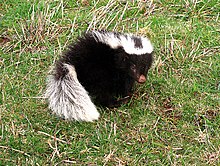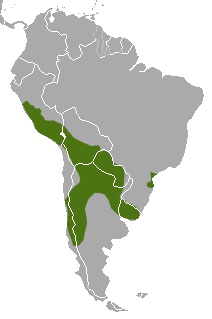Molina's hog-nosed skunk, also called the Andes skunk (Conepatus chinga), is a skunk species from South America. It is found in Argentina, Bolivia, Brazil, Chile, Peru, Paraguay, and Uruguay, at elevations up to 5000 m.
| Molina's hog-nosed skunk | |
|---|---|
 | |
| Scientific classification | |
| Domain: | Eukaryota |
| Kingdom: | Animalia |
| Phylum: | Chordata |
| Class: | Mammalia |
| Order: | Carnivora |
| Family: | Mephitidae |
| Genus: | Conepatus |
| Species: | C. chinga |
| Binomial name | |
| Conepatus chinga (Molina, 1782) | |
 | |
| Molina's hog-nosed skunk range | |
Habitat
The Molina's hog-nosed skunk's native range is throughout mid to southern South America, Chile, Peru, northern Argentina, Bolivia, Paraguay, Uruguay, and southern Brazil.[2] The mammal is therefore associated with temperate regions and open areas, mainly described as the Pampas biome[3] and preferring to live in open vegetation, shrub forest and rocky sloped areas.[2]
Population and distribution
Typically they will live alone in an average home range size of about 1.66 individuals/km2 with some overlapping and about six skunks per 3.5 km2.[4] Although living in mostly solitary areas, the skunks will come together temporarily for mating purposes.[2]
Diet
Foraging mainly at night, the skunk is omnivorous, eating birds, small mammals, eggs, insects, leaves, and fruit. The tooth morphology in the Molina's hog-nosed skunk, is different from most mammals in that their teeth are adapted to their omnivorous diet with grinding being the main function of the carnassial apparatus.[5]
Conservation status
The skunk is listed as "least concern" according to the IUCN Red List. The main threats to the skunk are increased habitat destruction and fragmentation[6] from over exploitation of humans and grazing in agriculture. The skunk is also affected by the planning of new roads and road-kills. Due to improper planning, habitat destruction, and fragmentation, the skunk has started living around man-made structures and along fences and buildings.[6]
References
Wikiwand in your browser!
Seamless Wikipedia browsing. On steroids.
Every time you click a link to Wikipedia, Wiktionary or Wikiquote in your browser's search results, it will show the modern Wikiwand interface.
Wikiwand extension is a five stars, simple, with minimum permission required to keep your browsing private, safe and transparent.

